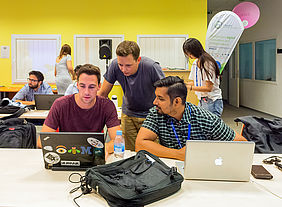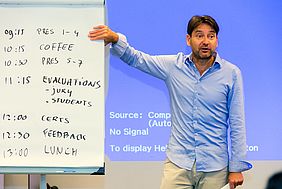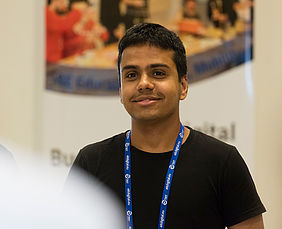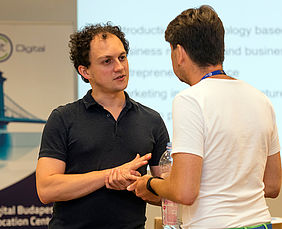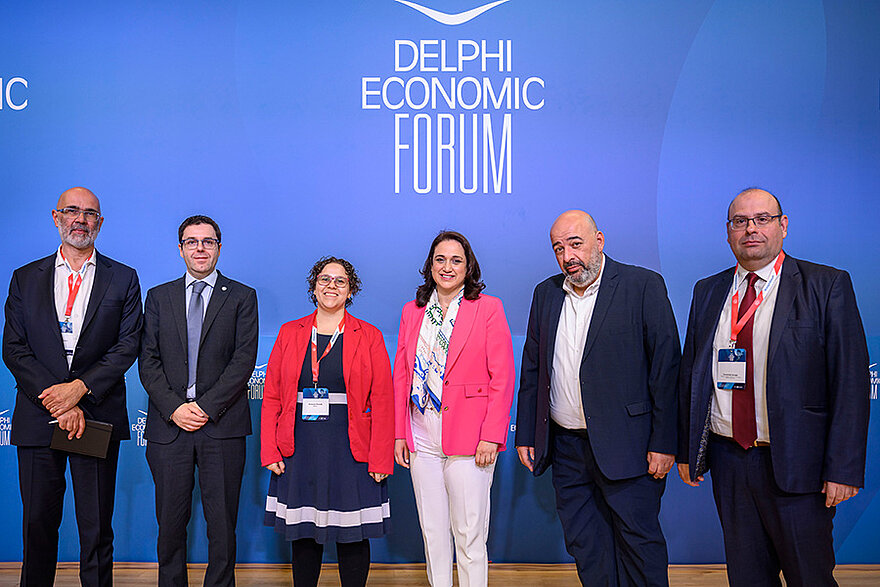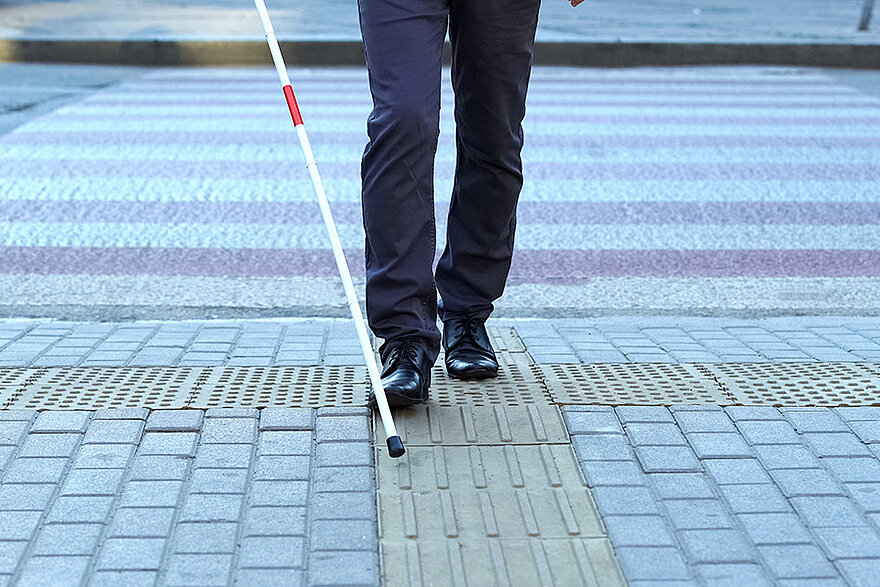How do you get new and innovative blockchain applications? Simple, put EIT Digital Master School students and business people in a sweltering Budapest Summer School on Digital Finance for two weeks, and you get eight solutions to four real-life business cases from EIT Digital's partners. What started as an educational project, turned out to deliver tangible value for EIT Digital partners and external attendees. "I am going to transform my company."
Krishna Iyer EasWaran, an EIT Digital Master School student studying Embedded Systems, asks for a full glass of water. His colleague pours a cup and passes it to someone in the audience who passes it through until it reaches EasWaran. "This is not a full cup", he says, illustrating what happens in the shipment of goods. During shipment, 0.5 percent of goods are lost or damaged, and 75 percent of the lost or damaged goods turn out not to be guaranteed by insurers, he states. "You need to prove where and when the goods got lost or damaged". This can be done by the business solution his team came up with, using blockchain. The slogan of the team: "The sea is rough but your insurance claim should not".
EasWaran is pitching his blockchain business solution on behalf of his team to a jury, the audience and the business case owner. The jury named this pitch as the winner from the eight participating teams.
Summer school
Summer Schools are a key element of the two-year EIT Digital Master School for enrolled students and voluntary for business learners, researchers who choose to spend two-weeks on an intensive course to hone both their technical knowledge and ability to innovate. As a result they take back new innovative ideas to their companies. This year was the first for the EIT Digital Academy to host a Summer School on Digital Finance. Students and external attendees have taken a deep dive into Digital Finance topics like blockchain,innovation, and entrepreneurship. The attendees have been exposed to the latest digital developments on blockchain and immersed themselves in real business cases originating from EIT Digital's pan-European partners.
Blockchain
Blockchain is not an easy topic to grasp and to build business cases on. To be able to understand and master blockchain technology, students were given classes by several expert professionals. One of them was Péter Szilágyi, team leader in the Ethereum project, who has been amongst the students for two weeks as a coach and have witnessed the learning curve of the attendees.
"After the first day, they had an idea what the technology is and how it works. When they learned more, the students got scared that it will get too complicated. The low point came after three days when they felt lost in the study material. Then pieces began to fall into place and they started to master the technology. It really surprises me that the attendees have now a very good understanding of the technology. Some students are already able to programme in Ethereum. Really amazing. I can imagine that almost all the business models, could really work on Ethereum. They are really meaningful."
Szilágyi explains that Ethereum is the next step in blockchain development. "Blockchain is a decentralised platform for transactions. Ethereum is a decentralised platform to run smart contracts. The bitcoin perspective comes from a virtual money system which has a global guarantee, because transactions cannot be altered or reverted. Governments cannot freeze funds, like in traditional banking systems. Within the Ethereum chain, you can create small programmes in the network with the same guarantees as blockchain offers: no government or agency can decide for you. You get rid of the middlemen."
Impact
The impact of centralised platform technology can be huge, expects Szilágyi, though it is hard to tell what exactly the impact will be. "Blockchain was born as an experiment, an academic paper of eight pages. Ethereum tries to perfect this and adds features and extras. The blockchain and Ethereum technology will, in the future, really impact the daily lives of people. Citizens oversee their own assets, like contracts and accounts. There will be no middlemen anymore. We know that blockchain has a huge potential but nobody knows what the outcome will be. It is a new concept. We will see. When the internet was born, nobody knew what to expect as well."
Good topic
Given that this technology is so new, why use the "Blockchain for economic security" as a topic at the EIT Digital Academy Summer School? Daniel Michel, Head of Access to Finance and interim Head of the new Digital Finance Action Line of EIT Digital, points out that just because it is a relatively unexplored arena, blockchain is a good topic. "That is exactly the point! Europe needs to be at the forefront of digital transformation. Therefore, we need to teach students what they need in five years time, so European companies can anticipate developments. Even if there are not so many applications yet, knowing about these technologies is valuable. Hence, blockchain is currently being investigated by many financial organisations. Blockchain has a huge potential to ensure trust in (financial) transactions. It is good for new engineers and professional learners to know how distributed systems work. The knowledge gained in this field can be applicable in different domains."
Bitcoin
For students, the new technology is exciting. They kept on talking about it and asked numerous questions to the coaches and speakers who joined their mutual dinners. The hunger for more knowledge and understanding seems more important to them then the longing for food, although they did not seem to have a problem with that either. The brains of an engineer seem to need a lot of vitamins. One night they went to the bar Anker Club that has a Bitcoin ATM, where László́ Raskó, business strategist at Shinrai treated them to an extra lecture about converting Euros into Bitcoins.
Fintech regulatory landscape in the EU
Besides the technical lesson, the students were also introduced to the marketing startups require and they were given a class in communication. Krisztina Balázs, a law lecturer at ELTE University in Hungary, elaborated in an interactive session on the FinTech regulatory landscape in the EU. "Who would you trust more: a bank or a FinTech?" To her, a customer can go to a Fintech company more cheaply, but be better off with a bank in terms of liability.
Good mix just in the right order
To EasWaran, the Summer School on Blockchain was highly educational. He even calls it "excellent." "The best thing is the timing. It was a good mix in the right order. The programme provides the content exactly when you need it. First, we had the case problem, then an introduction to the technology mixed with business classes. To me, the business view and how to identify business opportunities was most educational. And the atmosphere is very dynamic." EasWaran also liked the fact that ‘real' business people were his classmates for bringing in real life perspectives.
Professionals
Summer School attendee <link newsroom news article at-the-eit-digital-academy-summer-school-i-learned-the-skills-to-take-my-business-forward>Dr Roland Clarke, director of Clarke Energy Associates in Barbados, is in return very satisfied with having been surrounded by young technical master school students. "I liked it very much to be among the students. They have a technology background that I do not have. I have learned from them quite a bit. The lessons given by the instructors are very high level so when we work in groups, the students elaborate more about it. It inspired me. I am going to transform my company."
Applications
The Digital Finance Summer School has resulted in attendees understanding which applications could be of use for improving Europe's economy or improving its quality of life. The students have been able to transform business problems into ambitious business solutions. One group is pitching an on blockchain based solutions to compete with transaction services of big companies like PayPal and Worldpay. Another team came up with a marketplace based on blockchain that will better protect user privacy than normal marketplaces. "The digital world should be as secure as the offline world," is their statement. Smart insurance is the name of a blockchain business case that deals with the safe transfer of data required in the healthcare system. The team of the Dutch Master School student Thomas Langerak worked on a blockchain solution for making insurance claims. Team four provided a blockchain solution that can help privately owned gas stations make more money. The final pitch involved creating patient owned records of medical data by using blockchain: patients will have a better control on their data, and doctors all over Europe can access it with the patient's consent.
Under pressure
All presentations looked very professional. That didn't come out of the blue. The business coaches were constantly reviewing the progress of the teams and let the students work even harder. On the last days before the final pitches, some students worked through the night until the lights went out on the beautiful Budapest bridges. That's life.
Ákos Wetters, owner of Steeep and coach of several EIT Digital Summer Schools, showed no mercy. Nonetheless, he is very satisfied with how students conquered their learning curves and about the content of the solutions. "Students are used to following their own logic. But here, they also explore and execute entrepreneurship. Blockchain is so new that there are hardly any applications available students can relate to. There is not much context yet. The students have undergone a solid learning curve as well in their personal learnings, technology learnings and in the team development. In the end, they came up with something that could inspire the business owners."
Impressive
The students of the Summer School Digital Finance indeed impressed Jörg Heuer of Deutsche Telekom laboratories, an EIT Digital partner, who saw two pitches on a business case he provided. "The vibe and the overall spirit of this Summer School is amazing. This energy and the bright people involved are coming together to employ blockchain technology for viable business solutions. I am very happy with the quality of the solutions the attendees came up with for all the business cases."
Inspiring
Daniel Csendes, director of the Internet of People Consortium CLG, a non-profit blockchain consortium and one of the case owners, likes the approach of the winning team and he is even considering using the business model for his own company. Csendes had two teams working on his case. "The students were really engaged. That is one of the most important things for a startup. I would like to check the results of the winning team and see if there would be a possibility to cooperate with this team and with some other teams. I would like to aggregate the knowledge they are building into their blockchain business models. This project started as an education-only project, but it has turned into a real business model that I am willing to validate further. It has been very inspiring."
